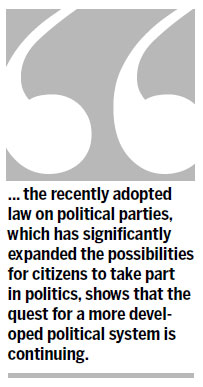Democracy is alive and well in Russia
Updated: 2012-05-07 08:06
By Andrey Vinogradov (China Daily)
|
|||||||||||

The inauguration of Vladimir Putin as Russia's President on May 7 has attracted much attention. Many in China view his return to the Kremlin as recognition of his efforts to stabilize the internal situation in Russia, promote successful economic development and strengthen international relations, including friendly relations with China.
However, in some Western countries political observers and politicians have expressed different views. The achievements of Putin's administration are viewed with concern and sometimes irritation. They can hardly conceal their dissatisfaction with Russia's revival. They would like Russia to remain in the dilapidated condition of the 1990s when it was on the verge of disintegration and was unable to protect its interests in world affairs. Some people in the West have claimed that the recent elections in Russia were not democratic and that Russian democracy is false. But what then are the criteria for democracy?
Democratic procedures are the main criteria to estimate the effectiveness of state government, its ability to solve the most pressing and complicated problems facing the society, and thus to provide political stability and economic development. Another requirement of modern democracy is its strict submission to the law. Russian democracy fully corresponds to these criteria. According to the Russian Constitution the presidency is limited by two consecutive terms. Putin fulfilled this legislative requirement four years ago and, despite his huge popularity and the numerous appeals of various social groups, he did not stand for a third term. Putin's victory in the first round of the elections earlier this year demonstrated the sincere and convincing support Putin enjoys from the majority of the Russian people.
What are the reasons for the criticism of the elections and Russia's political system? Western countries that historically were the first to begin the transition to the modern democratic form of government, like to proclaim that they are perfect democracies. In fact, many countries in Western Europe - Belgium, Denmark, the Netherlands, Norway, Spain, Sweden and the United Kingdom - retain constitutional monarchies. Yet few criticize this for being undemocratic, even though it owes more to the past than the present. We respect the choice of these peoples and understand that this form of government reflects national traditions that play a stabilizing role in these countries and help foster a national spirit. Russia has the same right to establish its political system, based not only on present requirements, but also on national traditions. Although, we hope that critics of modern Russia are not calling for a restoration of its monarchy.
There are even more obvious drawbacks in the United States' political system. As we all know the presidential elections in the United States are not direct. And it is not simply an insignificant influence of historical tradition, as it influences the results of elections. George W. Bush's victory in 2000 did not reflect the support by the majority of the American people, it was a consequence of a flaw in the electoral system, whereby he became president despite receiving fewer votes than his opponent. This anachronism is inconceivable in any other country in the 21st century. However, the consequences of this flawed democratic procedure effect, not just the US, but the entire international community, since the decisions of US presidents reverberate around the world. For example, the US invasions in Iraq and Afghanistan directly affected the development of these countries and dozens of millions of people in different ways and indirectly everyone else in the world.
Certainly, the political system being formed in Russia is not perfect, but it is still at an early stage of development. It is hard to predict, how the power transfer mechanism will work next time, with another generation. However, Putin's return to the presidency and the recently adopted law on political parties, which has significantly expanded the possibilities for citizens to take part in politics, show that the quest for a more developed political system is continuing.
The main principle of any modern state is that the state should serve the people, and the people should have the opportunity to express their own opinion concerning the efficiency of authorities in power and do it according to the Constitution.
The author is director of the Center of Political Research, the Russian Academy of Sciences.
Today's Top News
President Xi confident in recovery from quake
H7N9 update: 104 cases, 21 deaths
Telecom workers restore links
Coal mine blast kills 18 in Jilin
Intl scholarship puts China on the map
More bird flu patients discharged
Gold loses sheen, but still a safe bet
US 'turns blind eye to human rights'
Hot Topics
Lunar probe , China growth forecasts, Emission rules get tougher, China seen through 'colored lens', International board,
Editor's Picks

|

|

|

|

|

|





